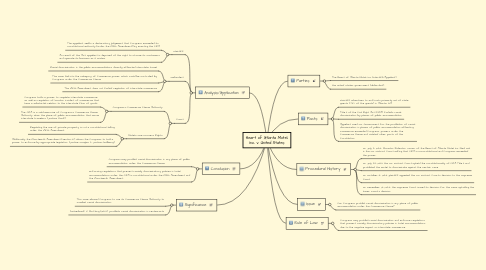Heart of Atlanta Motel, Inc. v. United States
by Areum Joo

1. Conclusion
1.1. Congress may prohibit racial discrimination in any place of public accommodation under the Commerce Clause.
1.2. enforcing regulations that prevent racially discriminatory policies in hotel accommodations under the CRA is constitutional under the Fifth Amendment and the Fourteenth Amendment.
2. Analysis/Application
2.1. Plaintiff
2.1.1. The appellant seeks a declaratory judgement that Congress exceeded its constitutional authority (under the Fifth Amendment) by enacting the CRA.
2.1.2. As result of the Act, appellant is deprived of the right to choose its customers and operate its business as it wishes.
2.2. Defendent
2.2.1. Racial discrimination in the public accommodations directly affected interstate travel
2.2.2. The case fell into the category of Commerce power which could be controlled by Congress under the Commerce Clause
2.2.3. The Fifth Amendment does not forbid regulation of interstate commerce
2.3. Court
2.3.1. Congress’s Commerce Clause Authority
2.3.1.1. Congress holds a power to regulate interstate commerce as well as regulation of location incident of commerce that have a substantial relation to the interstate flow of goods.
2.3.1.2. The CRA is a valid exercise of Congress’s Commerce Clause Authority when the place of public accommodation that serve interstate travelers. (Justice Clark)
2.3.2. Motel’s Due Process Rights
2.3.2.1. Regulating the use of private property is not a constitutional taking under the Fifth Amendment.
2.3.2.2. Additionally, the Fourteenth Amendment (section 5) allows the Congress to hold a power to enforce by appropriate legislation. (Justice Douglas & Justice Goldberg)
3. Significance
3.1. This case allowed Congress to use its Commerce Clause Authority to combat racial discrimination
3.2. Katzenback V. McClung (1964)- prohibits racial discrimination in restaurants
4. Facts
4.1. Plaintiff advertises to and hosts primarily out-of-state guests (75% of the guests) in Atlanta, GA.
4.2. Title II of the Civil Right Act (CRA) forbids racial discrimination by places of public accommodation.
4.3. Appellant sued U.S. Government for the prohibition of racial discrimination in places of public accommodation affecting commerce exceeded Congress' powers under the Commerce Clause and violated other parts of the Constitution.
5. Parties
5.1. The Heart of Atlanta Motel, Inc. (Plaintiff/Appellant)
5.2. the United States government (defendant)
6. Issue
6.1. Can Congress prohibit racial discrimination in any place of public accommodation under the Commerce Clause?
7. Rule of Law
7.1. Congress may prohibit racial discrimination and enforce regulations that prevent racially discriminatory policies in hotel accommodations due to the negative impact on interstate commerce.
8. Procedural History
8.1. On July 2, 1964, Moreton Rolleston, owner of the Heart of Atlanta Motel Inc filed suit in the U.S. District Court asking that CRA is unconstitutional and Congress exceeded the power.
8.2. On July 22, 1964 the U.S. District Court upheld the constitutionality of CRA Title II and prohibited the motel to discriminate against the certain race
8.3. On October 5, 1964 plaintiff appealed the U.S. District Court’s decision to the Supreme Court
8.4. On December 14, 1964, the Supreme Court issued its decision for the case, upholding the lower court’s decision

